金融市场学练习题
金融市场学习题集
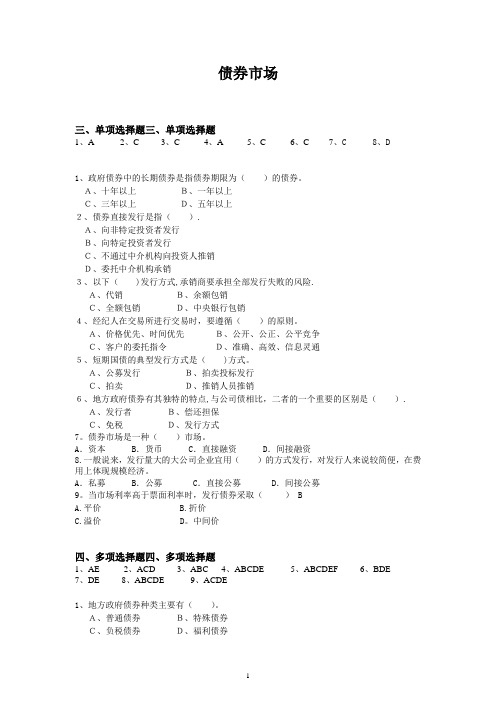
债券市场三、单项选择题三、单项选择题1、A2、C3、C4、A5、C6、C7、C8、D1、政府债券中的长期债券是指债券期限为()的债券。
A、十年以上B、一年以上C、三年以上D、五年以上2、债券直接发行是指().A、向非特定投资者发行B、向特定投资者发行C、不通过中介机构向投资人推销D、委托中介机构承销3、以下( )发行方式,承销商要承担全部发行失败的风险.A、代销B、余额包销C、全额包销D、中央银行包销4、经纪人在交易所进行交易时,要遵循()的原则。
A、价格优先、时间优先B、公开、公正、公平竞争C、客户的委托指令D、准确、高效、信息灵通5、短期国债的典型发行方式是( )方式。
A、公募发行B、拍卖投标发行C、拍卖D、推销人员推销6、地方政府债券有其独特的特点,与公司债相比,二者的一个重要的区别是().A、发行者B、偿还担保C、免税D、发行方式7。
债券市场是一种()市场。
A.资本 B.货币 C.直接融资 D.间接融资8.一般说来,发行量大的大公司企业宜用()的方式发行,对发行人来说较简便,在费用上体现规模经济。
A.私募 B.公募 C.直接公募 D.间接公募9。
当市场利率高于票面利率时,发行债券采取() BA.平价B.折价C.溢价 D。
中间价四、多项选择题四、多项选择题1、AE2、ACD3、ABC4、ABCDE5、ABCDEF6、BDE7、DE 8、ABCDE 9、ACDE1、地方政府债券种类主要有()。
A、普通债券B、特殊债券C、负税债券D、福利债券E、收益债券2、以下关于对短期国债阐述正确的是( )。
A、在英国、美国称为国库券B、其典型发行方式是公开发行的方式C、新发行的国库券主要有3个月、6个月、9个月和1年期四种D、短期国债是货币市场上最活跃、流动性很高的短期证券E、以国家信用作担保,存在一定的信用风险3、债券的实际收益率水平主要取决于()。
A、债券偿还期限B、债券的票面利率C、债券的发行价格D、债券的供求4、公司债券的发行要素包括().A、债券的发行额B、利息率及其支付方式C、发行价格D、债券的偿还期限E、偿还方式5、确定债券的发行利率,主要依据的因素有()。
金融市场学练习题.docx
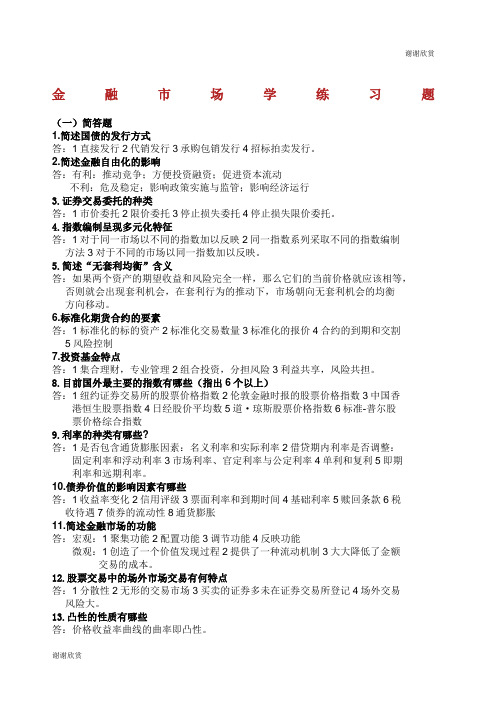
金融市场学练习题(一)简答题1.简述国债的发行方式答:1直接发行2代销发行3承购包销发行4招标拍卖发行。
2.简述金融自由化的影响答:有利:推动竞争;方便投资融资;促进资本流动不利:危及稳定;影响政策实施与监管;影响经济运行3.证券交易委托的种类答:1市价委托2限价委托3停止损失委托4停止损失限价委托。
4.指数编制呈现多元化特征答:1对于同一市场以不同的指数加以反映2同一指数系列采取不同的指数编制方法3对于不同的市场以同一指数加以反映。
5.简述“无套利均衡”含义答:如果两个资产的期望收益和风险完全一样,那么它们的当前价格就应该相等,否则就会出现套利机会,在套利行为的推动下,市场朝向无套利机会的均衡方向移动。
6.标准化期货合约的要素答:1标准化的标的资产2标准化交易数量3标准化的报价4合约的到期和交割5风险控制7.投资基金特点答:1集合理财,专业管理2组合投资,分担风险3利益共享,风险共担。
8.目前国外最主要的指数有哪些(指出6个以上)答:1纽约证券交易所的股票价格指数2伦敦金融时报的股票价格指数3中国香港恒生股票指数4日经股价平均数5道·琼斯股票价格指数6标准-普尔股票价格综合指数9.利率的种类有哪些?答:1是否包含通货膨胀因素:名义利率和实际利率2借贷期内利率是否调整:固定利率和浮动利率3市场利率、官定利率与公定利率4单利和复利5即期利率和远期利率。
10.债券价值的影响因素有哪些答:1收益率变化2信用评级3票面利率和到期时间4基础利率5赎回条款6税收待遇7债券的流动性8通货膨胀11.简述金融市场的功能答:宏观:1聚集功能2配置功能3调节功能4反映功能微观:1创造了一个价值发现过程2提供了一种流动机制3大大降低了金额交易的成本。
12.股票交易中的场外市场交易有何特点答:1分散性2无形的交易市场3买卖的证券多未在证券交易所登记4场外交易风险大。
13.凸性的性质有哪些答:价格收益率曲线的曲率即凸性。
金融市场学考试试题
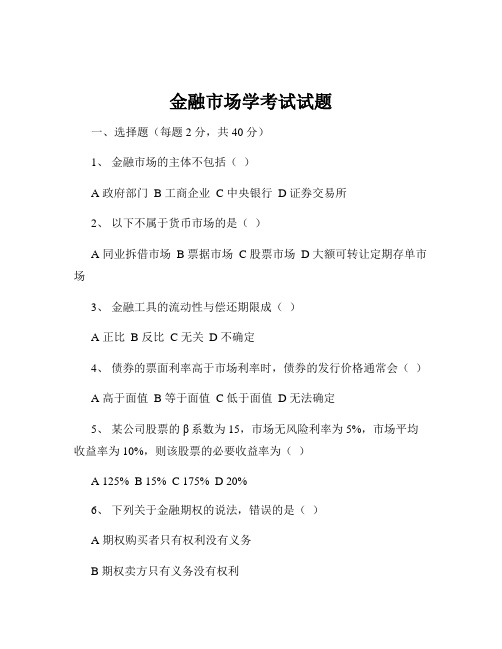
金融市场学考试试题一、选择题(每题 2 分,共 40 分)1、金融市场的主体不包括()A 政府部门B 工商企业C 中央银行D 证券交易所2、以下不属于货币市场的是()A 同业拆借市场B 票据市场C 股票市场D 大额可转让定期存单市场3、金融工具的流动性与偿还期限成()A 正比B 反比C 无关D 不确定4、债券的票面利率高于市场利率时,债券的发行价格通常会()A 高于面值B 等于面值C 低于面值D 无法确定5、某公司股票的β系数为 15,市场无风险利率为 5%,市场平均收益率为 10%,则该股票的必要收益率为()A 125%B 15%C 175%D 20%6、下列关于金融期权的说法,错误的是()A 期权购买者只有权利没有义务B 期权卖方只有义务没有权利C 期权交易双方的权利和义务是对等的D 金融期权可以分为看涨期权和看跌期权7、金融期货交易的对象是()A 金融商品B 金融期货合约C 金融远期合约D 金融期权合约8、有效市场假说中,弱式有效市场的特点是()A 股价反映了历史价格信息B 股价反映了所有公开信息C 股价反映了内部信息D 股价随机波动9、以下属于系统性风险的是()A 经营风险B 财务风险C 利率风险D 信用风险10、下列不属于商业银行在金融市场中扮演的角色的是()A 资金需求者B 资金供给者C 金融中介D 监管者11、下列关于金融市场功能的说法,错误的是()A 资金融通功能是金融市场最基本的功能B 风险分散功能是将风险在不同投资者之间进行分配C 价格发现功能是指金融资产的价格能够反映其内在价值D 宏观调控功能是指金融市场能够调节宏观经济的运行,但不能影响货币政策的实施12、以下不属于资本市场的是()A 长期债券市场B 基金市场C 外汇市场D 股票市场13、某企业发行面值为 1000 元,票面利率为 8%,期限为 5 年的债券,每年付息一次,若市场利率为 10%,则该债券的发行价格为()A 92416 元B 1000 元C 107987 元D 88678 元14、投资者购买了一张面值 1000 元,期限 3 年,票面利率 8%,每年付息一次的债券。
金融市场学试题及答案

金融市场学试题及答案一、单项选择题(每题2分,共20分)1. 金融市场的主要功能是()。
A. 融资B. 投资C. 风险管理D. 以上都是答案:D2. 下列哪项不是金融市场的特点?()。
A. 流动性B. 风险性C. 稳定性D. 收益性答案:C3. 货币市场和资本市场的主要区别在于()。
A. 交易的金融工具B. 交易的规模C. 交易的期限D. 交易的参与者答案:C4. 股票市场属于()市场。
A. 货币市场B. 资本市场C. 外汇市场D. 衍生品市场答案:B5. 债券的面值通常是多少?()。
A. 100元B. 1000元C. 10000元D. 100000元答案:A6. 下列哪项是金融市场的中介机构?()。
A. 中央银行B. 投资银行C. 保险公司D. 以上都是答案:D7. 利率是衡量()的指标。
A. 货币的时间价值B. 货币的购买力C. 货币的流动性D. 货币的稳定性答案:A8. 期权是一种()。
A. 债权B. 债务C. 权利D. 义务答案:C9. 金融市场的参与者包括()。
A. 政府B. 企业C. 个人D. 以上都是答案:D10. 金融市场的监管机构通常负责()。
A. 制定市场规则B. 监督市场行为C. 维护市场秩序D. 以上都是答案:D二、多项选择题(每题3分,共15分)1. 金融市场的参与者通常包括()。
A. 政府B. 企业C. 个人D. 中央银行答案:ABCD2. 金融市场的类型包括()。
A. 货币市场B. 资本市场C. 外汇市场D. 衍生品市场答案:ABCD3. 影响金融市场的因素包括()。
A. 宏观经济政策B. 市场供求关系C. 投资者心理D. 国际政治经济形势答案:ABCD4. 下列哪些是金融市场的功能?()。
A. 资金融通B. 价格发现C. 风险分散D. 信息传递答案:ABCD5. 金融市场的中介机构包括()。
A. 商业银行B. 投资银行C. 证券公司D. 保险公司答案:ABCD三、判断题(每题1分,共10分)1. 金融市场是金融资产交易的场所。
(完整版)金融市场学题库

(完整版)金融市场学题库-CAL-FENGHAI-(2020YEAR-YICAI)_JINGBIAN金融市场学一、单选题1.金融市场被称为国民经济的“晴雨表”,这实际上指的就是金融市场( D )。
A.分配功能 B.财富功能 C.流动性功能 D.反映功能2.金融市场的宏观经济功能不包括( B )。
A.分配功能 B.财富功能 C.调节功能 D.反映功能3.金融市场的配置功能不表现( C )方面。
A.资源的配置 B.财富的再分配 C.信息的再分配 D.风险的再分配4.金融工具的收益有两种形式,其中下列哪项收益形式与其它几项不同( D )。
A.利息 B.股息 C.红利 D.资本利得5.一般来说,( B )不影响金融工具的安全性。
A.发行人的信用状况 B.金融工具的收益大小 C.发行人的经营状况D.金融工具本身的设计6.按( D )划分为货币市场、资本市场、外汇市场、保险市场、衍生金融市场。
A.交易范围 B.交易方式 C.定价方式 D.交易对象7.( B )是货币市场区别于其它市场的重要特征之一。
A.市场交易频繁 B.市场交易量大 C.市场交易灵活 D.市场交易对象固定8.( A )一般没有正式的组织,其交易活动不是在特定的场所中集中开展,而是通过电信网络形式完成。
A.货币市场 B.资本市场 C.外汇市场 D.保险市场三、判断题1.金融市场媒体(不管是中介机构还是经纪人)参与金融市场活动时,并非真正意义上的货币资金供给者或需求者。
(√)2.金融工具交易或买卖过程中所产生的运行机制,是金融市场的深刻内涵和自然发展,其中最核心的是供求机制。
( X )3.金融市场被称为国民经济的“晴雨表”,这实际上指的就是金融市场调节功能。
( X )4.金融中介性媒体不仅包括存款性金融机构、非存款性金融机构以及作为金融市场监管者的中央银行,而且包括金融市场经纪人。
(√)5.资本市场是指以期限在一年以内的金融工具为交易对象的短期金融市场。
金融市场学试题及答案
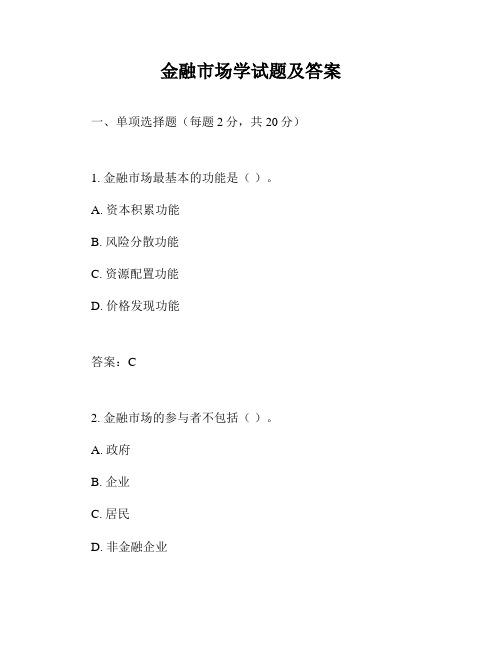
金融市场学试题及答案一、单项选择题(每题2分,共20分)1. 金融市场最基本的功能是()。
A. 资本积累功能B. 风险分散功能C. 资源配置功能D. 价格发现功能答案:C2. 金融市场的参与者不包括()。
A. 政府B. 企业C. 居民D. 非金融企业答案:D3. 以下哪个不是货币市场工具?()。
A. 短期国债B. 银行承兑汇票C. 股票D. 商业票据答案:C4. 以下哪个不是金融市场的中介机构?()。
A. 商业银行B. 投资银行C. 保险公司D. 会计师事务所答案:D5. 以下哪个是直接融资的特点?()A. 融资成本较高B. 融资中介费用较低C. 融资效率较低D. 融资风险较低答案:B6. 以下哪个是金融市场的监管机构?()A. 中国人民银行B. 中国证监会C. 中国银保监会D. 以上都是答案:D7. 以下哪个不是金融市场的分类方式?()A. 按交易工具的期限B. 按交易的组织形式C. 按交易的地域D. 按交易的规模答案:D8. 以下哪个是金融市场的衍生工具?()A. 股票B. 债券C. 期货D. 存款单答案:C9. 以下哪个不是金融市场的风险类型?()A. 市场风险B. 信用风险C. 流动性风险D. 操作风险答案:D10. 以下哪个是金融市场的交易方式?()A. 现货交易B. 期货交易C. 期权交易D. 以上都是答案:D二、多项选择题(每题3分,共15分)1. 金融市场的功能包括()。
A. 资本积累B. 资源配置C. 风险分散D. 价格发现答案:ABCD2. 金融市场的参与者包括()。
A. 政府B. 企业C. 居民D. 非金融企业答案:ABCD3. 货币市场工具包括()。
A. 短期国债B. 银行承兑汇票C. 股票D. 商业票据答案:ABD4. 金融市场的中介机构包括()。
A. 商业银行B. 投资银行C. 保险公司D. 会计师事务所答案:ABC5. 直接融资的特点包括()。
A. 融资成本较高B. 融资中介费用较低C. 融资效率较低D. 融资风险较低答案:BD三、判断题(每题2分,共20分)1. 金融市场是资金融通的场所。
金融市场学习题及答案
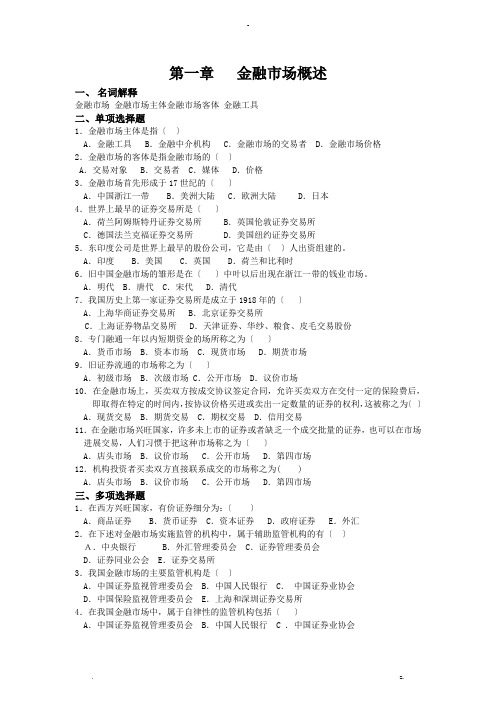
第一章金融市场概述一、名词解释金融市场金融市场主体金融市场客体金融工具二、单项选择题1.金融市场主体是指〔〕A.金融工具 B.金融中介机构 C.金融市场的交易者 D.金融市场价格2.金融市场的客体是指金融市场的〔〕A.交易对象 B.交易者 C.媒体 D.价格3.金融市场首先形成于17世纪的〔〕A.中国浙江一带 B.美洲大陆 C.欧洲大陆 D.日本4.世界上最早的证券交易所是〔〕A.荷兰阿姆斯特丹证券交易所B.英国伦敦证券交易所C.德国法兰克福证券交易所 D.美国纽约证券交易所5.东印度公司是世界上最早的股份公司,它是由〔〕人出资组建的。
A.印度B.美国 C.英国 D.荷兰和比利时6.旧中国金融市场的雏形是在〔〕中叶以后出现在浙江一带的钱业市场。
A.明代 B.唐代 C.宋代 D.清代7.我国历史上第一家证券交易所是成立于1918年的〔〕A.上海华商证券交易所 B.北京证券交易所C.上海证券物品交易所 D.天津证券、华纱、粮食、皮毛交易股份8.专门融通一年以内短期资金的场所称之为〔〕A.货币市场 B.资本市场 C.现货市场 D.期货市场9.旧证券流通的市场称之为〔〕A.初级市场 B.次级市场 C.公开市场 D.议价市场10.在金融市场上,买卖双方按成交协议签定合同,允许买卖双方在交付一定的保险费后,即取得在特定的时间内,按协议价格买进或卖出一定数量的证券的权利,这被称之为〔〕A.现货交易 B.期货交易 C.期权交易 D.信用交易11.在金融市场兴旺国家,许多未上市的证券或者缺乏一个成交批量的证券,也可以在市场进展交易,人们习惯于把这种市场称之为〔〕A.店头市场 B.议价市场 C.公开市场 D.第四市场12.机构投资者买卖双方直接联系成交的市场称之为( )A.店头市场 B.议价市场 C.公开市场 D.第四市场三、多项选择题1.在西方兴旺国家,有价证券细分为:〔〕A.商品证券 B.货币证券 C.资本证券 D.政府证券 E.外汇2.在下述对金融市场实施监管的机构中,属于辅助监管机构的有〔〕A.中央银行 B.外汇管理委员会 C.证券管理委员会D.证券同业公会 E.证券交易所3.我国金融市场的主要监管机构是〔〕A.中国证券监视管理委员会 B.中国人民银行 C.中国证券业协会D.中国保险监视管理委员会 E.上海和深圳证券交易所4.在我国金融市场中,属于自律性的监管机构包括〔〕A.中国证券监视管理委员会 B.中国人民银行 C .中国证券业协会D.中国保险监视管理委员会 E.上海和深圳证券交易所四、判断1.由于世界各国金融市场的兴旺程度不同,因此市场本身的构成要素也不同。
金融市场学试题(含参考答案)
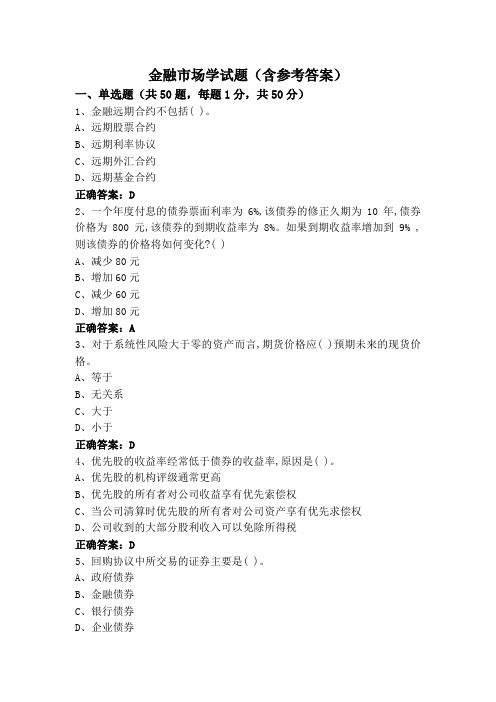
金融市场学试题(含参考答案)一、单选题(共50题,每题1分,共50分)1、金融远期合约不包括( )。
A、远期股票合约B、远期利率协议C、远期外汇合约D、远期基金合约正确答案:D2、一个年度付息的债券票面利率为6%,该债券的修正久期为10年,债券价格为800元,该债券的到期收益率为8%。
如果到期收益率增加到9% ,则该债券的价格将如何变化?( )A、减少80元B、增加60元C、减少60元D、增加80元正确答案:A3、对于系统性风险大于零的资产而言,期货价格应( )预期未来的现货价格。
A、等于B、无关系C、大于D、小于正确答案:D4、优先股的收益率经常低于债券的收益率,原因是( )。
A、优先股的机构评级通常更高B、优先股的所有者对公司收益享有优先索偿权C、当公司清算时优先股的所有者对公司资产享有优先求偿权D、公司收到的大部分股利收入可以免除所得税正确答案:D5、回购协议中所交易的证券主要是( )。
A、政府债券B、金融债券C、银行债券D、企业债券正确答案:A6、如果股票价格上升,则该股票的看跌期权价格( ),看涨期权价格( )。
A、上涨,上涨B、下跌,上涨C、上涨,下跌D、下跌,下跌正确答案:B7、从投资角度看,以下哪个不是投资者最为重视的( )。
A、收益性B、稳定性C、流动性D、安全性正确答案:B8、ABS信用等级中最高级别为( )。
A、AAAB、SSSC、AABD、BBB正确答案:A9、如果不考虑时间价值,欧式看涨期权合约与远期合约多头的唯一区别就是前者( )。
A、有义务也有权利B、只有义务没有权利C、既没有义务也没有权利D、只有权利没有义务正确答案:D10、下列不属于普通股的是( )。
A、收入胡B、成长股C、累计优先股D、蓝筹股正确答案:C11、可转换债券与股票相比( )。
A、赎回条款B、有优先偿还的要求权C、转换期D、回售条款正确答案:B12、()是期限在一年以上的中长期金融市场,其基本功能是实现并优化投资与消费的跨时期选择。
金融市场学试题及答案

金融市场学试题及答案一、单项选择题(每题1分,共10分)1. 金融市场的基本功能是()。
A. 资金的分配B. 风险的转移C. 信息的传递D. 以上都是2. 以下哪项不是金融市场的特点?()。
A. 高效性B. 流动性C. 稳定性D. 灵活性3. 股票市场属于()。
A. 货币市场B. 资本市场C. 外汇市场D. 商品市场4. 以下哪种工具不属于衍生金融工具?()。
A. 股票B. 期货C. 期权D. 掉期5. 利率的变动对金融市场的影响是()。
A. 无关紧要B. 影响有限C. 影响较大D. 决定性影响6. 以下哪个是金融市场的监管机构?()。
A. 国家统计局B. 中国人民银行C. 教育部D. 国家税务总局7. 金融市场的参与者主要包括()。
A. 政府B. 企业C. 个人D. 以上都是8. 以下哪个不是金融市场的风险类型?()。
A. 信用风险B. 市场风险C. 操作风险D. 政治风险9. 金融市场的交易方式主要有()。
A. 现货交易B. 期货交易C. 期权交易D. 以上都是10. 金融市场的定价机制通常依赖于()。
A. 供需关系B. 政府规定C. 个人偏好D. 以上都是二、多项选择题(每题2分,共10分)11. 金融市场的分类方式包括()。
A. 按交易工具分类B. 按交易场所分类C. 按交易时间分类D. 按交易主体分类12. 金融市场的交易工具包括()。
A. 股票B. 债券C. 存款D. 贷款13. 金融市场的监管目的主要包括()。
A. 维护市场秩序B. 保护投资者利益C. 防范金融风险D. 促进经济发展14. 金融市场的参与者除了政府、企业和个人外,还包括()。
A. 银行B. 保险公司C. 证券公司D. 投资基金15. 金融市场的风险管理方法包括()。
A. 风险分散B. 风险转移C. 风险对冲D. 风险规避三、判断题(每题1分,共10分)16. 金融市场是经济体系中的重要组成部分。
()17. 金融市场的交易都是现货交易。
金融市场学练习题

第一章1.我国上海证券交易所和深圳证券交易所分别于__年和__年成立,标志着中国股票集中交易市场的正式形成。
解答:1990 19912.采用私募方式发行证券,其发行对象一般为__。
解答:机构投资者3.目前我国的__实际上充当着投资银行的角色,开展投行业务。
解答:证券公司4.金融市场的客体是指金融市场的金融工具。
5.五大黄金市场——伦敦、纽约、苏黎世、芝加哥、香港。
第二章1.在现实中,金融机构的盈利性和流动性之间呈__关系解答:反相关2.回购交易实际上是一种用较高信用的证券特别是__作抵押的贷款方式,风险相对较小解答:政府债券3.竞争式投标按照最终价格确定方式可以分为__和__两种。
解答:荷兰式和美国式或单一价格和多种价格4.按照发行者不同,大额定期存单可分为:A国内存单B欧洲美元存单C扬基存单D储蓄机构存单解答:ABCD5.货币市场的“深度”是指货币市场交易的活跃程度。
货币市场的广度是指货币市场参与者的多样化,货币市场的弹性是指货币市场在应复突发事件及大手笔成交之后价格的迅速调整能力。
6.银行承兑汇票的转让一般是通过贴现方式进行。
7.相对于货币市场其他子市场的利率水平,回购利率较低。
8.联邦基金也属于货币商场的金融工具。
9.大额可转让定期存单的最主要买主是货币市场基金。
10.回购协议中实物交割回购利率较低。
第三章1.我股股份公司发行股票的发行制度为__。
解答:核准制、保荐人制2.债券二级市场上的交易,主要有三种形式,即__、__和__。
解答:现货交易、期货交易、回购交易3.目前,在国际市场上较多采用的债券全额包销方式为:A协议包销B俱乐部包销C银团包销D委托包销解答:C4.根据价格决定的特点,证券交易制度可以分为A做市商交易制度B竞价交易制度C报价驱动制度D委托驱动制度解答:ABCD5.公司型基金和契约型基金的主要区别在于:A法人资格不同B投资目标不同C融资渠道不同D资金运营不同解答:ACD6.一般而言,股票私募发行多采用直接发行方式,而公募发行则多采用间接发行方式。
金融市场学测试题与参考答案
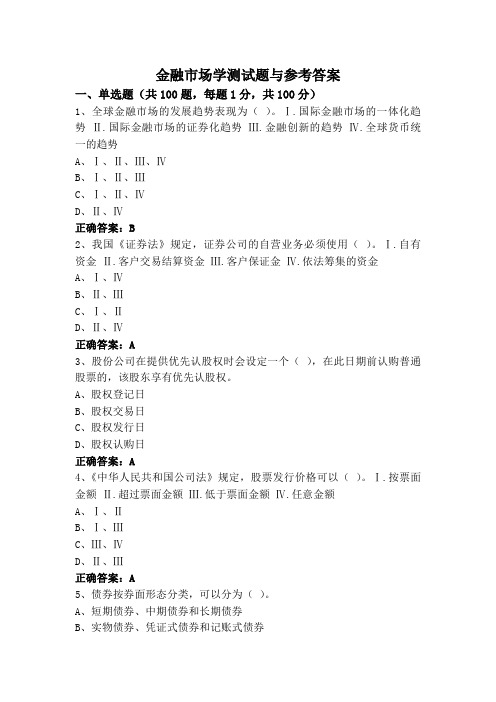
金融市场学测试题与参考答案一、单选题(共100题,每题1分,共100分)1、全球金融市场的发展趋势表现为()。
Ⅰ.国际金融市场的一体化趋势Ⅱ.国际金融市场的证券化趋势Ⅲ.金融创新的趋势Ⅳ.全球货币统一的趋势A、Ⅰ、Ⅱ、Ⅲ、ⅣB、Ⅰ、Ⅱ、ⅢC、Ⅰ、Ⅱ、ⅣD、Ⅱ、Ⅳ正确答案:B2、我国《证券法》规定,证券公司的自营业务必须使用()。
Ⅰ.自有资金Ⅱ.客户交易结算资金Ⅲ.客户保证金Ⅳ.依法筹集的资金A、Ⅰ、ⅣB、Ⅱ、ⅢC、Ⅰ、ⅡD、Ⅱ、Ⅳ正确答案:A3、股份公司在提供优先认股权时会设定一个(),在此日期前认购普通股票的,该股东享有优先认股权。
A、股权登记日B、股权交易日C、股权发行日D、股权认购日正确答案:A4、《中华人民共和国公司法》规定,股票发行价格可以()。
Ⅰ.按票面金额Ⅱ.超过票面金额Ⅲ.低于票面金额Ⅳ.任意金额A、Ⅰ、ⅡB、Ⅰ、ⅢC、Ⅲ、ⅣD、Ⅱ、Ⅲ正确答案:A5、债券按券面形态分类,可以分为()。
A、短期债券、中期债券和长期债券B、实物债券、凭证式债券和记账式债券C、政府债券、金融债券和公司债券D、零息债券、附息债券和息票累积债券正确答案:B6、我国混合资本债券的基本特征包括()。
Ⅰ.期限在15年以上Ⅱ.发行之日起12年内不得赎回Ⅲ.到期前若发行人核心资本充足率低于4%,可以延期支付利息Ⅳ.清算时本金和利息清偿顺序列于次级债务之后A、Ⅰ、Ⅱ、Ⅲ、ⅣB、Ⅱ、Ⅲ、ⅣC、Ⅰ、Ⅲ、ⅣD、Ⅰ、Ⅱ正确答案:C7、从证券经纪业务营销包括的主要环节来看,下列不属于营销人员客户服务内容的是()。
A、为客户提供针对性投资建议B、对客户提供开户指导C、客户关系维护D、向客户介绍证券基础知识正确答案:A8、由证券交易所组织的,有固定的交易场所和交易活动时间的集中交易市场指的是()。
A、柜台交易市场B、店头交易市场C、场外交易市场D、场内交易市场正确答案:D9、设立基金管理公司,应当具备的条件之一是:主要股东具有从事证券经营、证券投资咨询、信托资产管理或者其他金融资产管理经验并取得较好的经营业绩和良好的社会信誉,最近()年没有违法记录。
金融市场学--习题集(DOC)
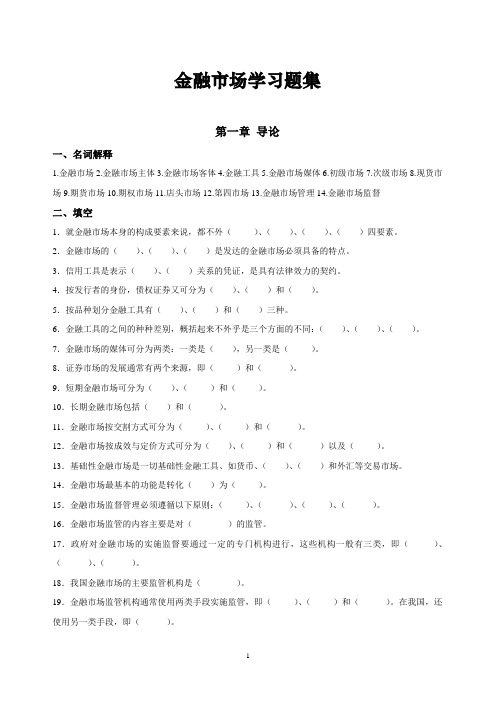
金融市场学习题集第一章导论一、名词解释1.金融市场2.金融市场主体3.金融市场客体4.金融工具5.金融市场媒体6.初级市场7.次级市场8.现货市场9.期货市场10.期权市场11.店头市场12.第四市场13.金融市场管理14.金融市场监督二、填空1.就金融市场本身的构成要素来说,都不外()、()、()、()四要素。
2.金融市场的()、()、()是发达的金融市场必须具备的特点。
3.信用工具是表示()、()关系的凭证,是具有法律效力的契约。
4.按发行者的身份,债权证券又可分为()、()和()。
5.按品种划分金融工具有()、()和()三种。
6.金融工具的之间的种种差别,概括起来不外乎是三个方面的不同:()、()、()。
7.金融市场的媒体可分为两类:一类是(),另一类是()。
8.证券市场的发展通常有两个来源,即()和()。
9.短期金融市场可分为()、()和()。
10.长期金融市场包括()和()。
11.金融市场按交割方式可分为()、()和()。
12.金融市场按成效与定价方式可分为()、()和()以及()。
13.基础性金融市场是一切基础性金融工具、如货币、()、()和外汇等交易市场。
14.金融市场最基本的功能是转化()为()。
15.金融市场监督管理必须遵循以下原则:()、()、()、()。
16.金融市场监管的内容主要是对()的监管。
17.政府对金融市场的实施监督要通过一定的专门机构进行,这些机构一般有三类,即()、()、()。
18.我国金融市场的主要监管机构是()。
19.金融市场监管机构通常使用两类手段实施监管,即()、()和()。
在我国,还使用另一类手段,即()。
三、单项选择1.金融市场主体是指()。
A.金融工具B金融中介机构C.金融市场的交易者D.金融市场价格2.金融市场的客体是指金融市场的( ).A.交易对象B.交易者C.媒体D交易价格3.金融市场首先形成于17世纪初的( )。
A中国浙江一带B.美国大陆C.欧洲大陆D.日本4.世界上最早的证券交易所是( ).A.荷兰阿姆斯特丹证券交易所B.英国伦敦证券交易所C.德国法兰克福证券交易所D.美国纽约证券交易所5.东印度公司是世界上最早的股份公司,它是由( )出资组建的.A.印度B美国C英国D荷兰和比利时6.旧中国金融市场的雏形是在( )中叶以后出现在浙江一带的钱业市场.A.明代B.唐代C.宋代D.清代7.我国历史上第一家证券交易所是成立于1981年的( ).A.上海华商证券交易所B北京证券交易所C上海证券物品交易所D天津证券、华纱、粮食、皮毛交易股份有限公司8.专门融通一年以内短期资金的场所称之为()。
金融市场学试题及答案
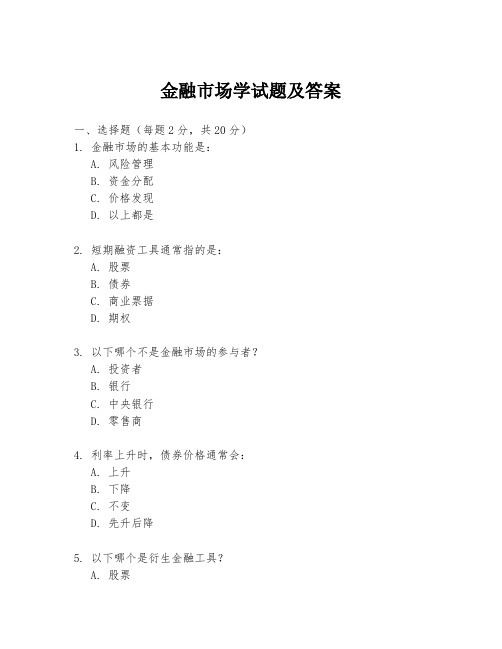
金融市场学试题及答案一、选择题(每题2分,共20分)1. 金融市场的基本功能是:A. 风险管理B. 资金分配C. 价格发现D. 以上都是2. 短期融资工具通常指的是:A. 股票B. 债券C. 商业票据D. 期权3. 以下哪个不是金融市场的参与者?A. 投资者B. 银行C. 中央银行D. 零售商4. 利率上升时,债券价格通常会:A. 上升B. 下降C. 不变D. 先升后降5. 以下哪个是衍生金融工具?A. 股票B. 债券C. 期货D. 存款6. 金融市场的效率分为哪三种类型?A. 信息效率、交易效率、价格效率B. 信息效率、市场效率、管理效率C. 信息效率、市场效率、交易效率D. 信息效率、管理效率、交易效率7. 以下哪个是金融市场的监管机构?A. 证券交易所B. 银行C. 证券监督管理委员会D. 保险公司8. 股票的面值与市场价格之间的关系是:A. 总是相等B. 总是不等C. 有时相等D. 没有直接关系9. 以下哪个是金融市场的风险管理工具?A. 股票B. 债券C. 保险D. 存款10. 期货合约的交易双方在合约到期时:A. 必须进行实物交割B. 可以选择实物交割或现金结算C. 只能现金结算D. 不需要结算二、简答题(每题10分,共30分)1. 简述金融市场的分类及其特点。
2. 描述金融市场中的信息不对称问题,并举例说明。
3. 解释什么是期权以及期权的基本类型。
三、计算题(每题15分,共30分)1. 某投资者购买了一份面值为1000元,年利率为5%的债券。
如果市场利率上升至6%,计算该债券的当前市场价格。
2. 假设某公司股票的当前价格为50元,预计未来一年股息为2元,如果投资者要求的回报率为10%,请计算该股票的合理价格。
四、论述题(20分)1. 论述金融市场在现代经济体系中的作用及其重要性。
答案:一、选择题1. D2. C3. D4. B5. C6. C7. C8. B9. C10. B二、简答题1. 金融市场可以分为货币市场和资本市场。
金融市场学练习题

金融市场学习题一、单项选择:(每小题1分,共10分)1.金融市场上的()剧烈波动,吸引了更多的投资者。
A.利润B.利润率C.收入D.价格2.金融市场的主体.是指()A.金融工具B.金融中介机构C.金融市场的交易者D.金融市场价格3.商业银行或其他金融机构以其持有的未到期汇票向中央银行所做的票据转让行为,称之为()。
A.贴现 B、再贴现C.转贴现D.承兑4.大户操作者将某类股价炒高后,发现再炒高的幅度有限,乘机卖出,转而炒作他类行情尚未波动的股票,称作()。
A.转帐B.烘托C.轮做D.轧空5.银行汇票是指()A.银行收受汇票B.银行承兑的汇票C.银行签发的汇票D.银行贴现的汇票6.专门接受佣金经纪人的委托,代理买卖有价证券的经纪人被称为()A.两元经纪人B.专家经纪人C.证券经纪人D.零股经纪人7.在股票、债券投资操作过程中,投资者最关心()方面。
A.变现能力比率B.资产管理比率C.负债比率D.盈利能力比率8.在股市投资分析当中,图形形态分析主要侧重于股价的()。
A.长期走势B.中长期走势C.短期走势D.中短期走势9.中央银行降低再贴现率,将()A.抑制货币需求B.刺激货币需求C.缩小银行信用D.紧缩市场银根10.对股价变动影响最大、也最直接的因素是()A.经济增长B.利率C.财政收支D.货币供应量一、单选题1、机构投资者买卖双方直接联系成交的市场称之为()A、店头市场B、议价市场C、公开市场D、第四市场2、作为盈利性的法人企业,()是证券市场的重要参加者和中介机构。
A、证券交易所B、投资银行C、商人银行D、证券公司3、最早实行存款准备金制度的中央银行是()A、联邦储备银行B、英格兰银行C、法兰西银行D、中国人民银行4、股份公司在发行股票时,以票面金额为发行价格,这种发行是()A、市价发行B、折价发行C、中间价发行 C、溢价发行5、从理论上讲,债券的转让价格主要取决于债券的()A、内在价值B、发行价格C、流通价格D、市场收益率6、金融市场的客体是指金融市场的()A、交易对象B、交易者C、交易工具D、交易价格7、利用不同交割期所造成的汇率差异,在买入或卖出即期外汇的同时,卖出或买入远期外汇,称之为()A、时间套汇B、地点套汇C、直接套汇D、间接套汇8、金融市场上的()剧烈波动,吸引了更多的投资者。
金融市场学试题及答案

金融市场学试题及答案一、选择题(每题2分,共20分)1. 金融市场的主要功能是什么?A. 资源配置B. 风险管理C. 支付结算D. 所有以上选项答案:D2. 下列哪个不是货币市场工具?A. 国债B. 同业存单C. 商业票据D. 股票答案:D3. 股票发行时,面值100元,发行价120元,这种发行方式称为?A. 溢价发行B. 等价发行C. 折价发行D. 零价发行答案:A4. 在金融市场中,"FOMO"是指?A. 恐惧错过B. 金融操作失误C. 金融管理办公室D. 期货期权市场答案:A5. 以下哪个指标常用于衡量债券的利率风险?A. 久期B. 贝塔系数C. 夏普比率D. 收益率曲线答案:A6. 什么是衍生金融工具?A. 基于基础金融工具的金融产品B. 直接从金融市场交易中产生的产品C. 仅在场外交易市场交易的产品D. A和C答案:D7. 以下哪个不是影响汇率变动的主要因素?A. 利率差异B. 政治稳定性C. 国际贸易平衡D. 公司盈利水平答案:D8. 什么是资产组合理论?A. 投资组合中资产之间的相关性对风险和收益的影响B. 投资组合中资产的数量对风险和收益的影响C. 投资组合中资产的类型对风险和收益的影响D. 投资组合中资产的配置对风险和收益的影响答案:A9. 什么是回购协议?A. 一种短期借款,卖方出售证券并同意在未来以更高价格回购B. 一种长期借款,卖方出售证券并同意在未来以相同价格回购C. 一种短期投资,买方购买证券并同意在未来以更低价格卖回D. 一种长期投资,买方购买证券并同意在未来以相同价格卖回答案:A10. 以下哪个是最常见的金融衍生品?A. 期货B. 期权C. 互换D. 以上全部答案:D二、填空题(每题2分,共20分)1. 金融市场可以分为__________和__________两部分,前者包括股票市场和债券市场,后者包括外汇市场和衍生品市场。
答案:一级市场;二级市场2. 金融衍生品的主要目的是__________和__________。
金融市场学习题库(附参考答案)
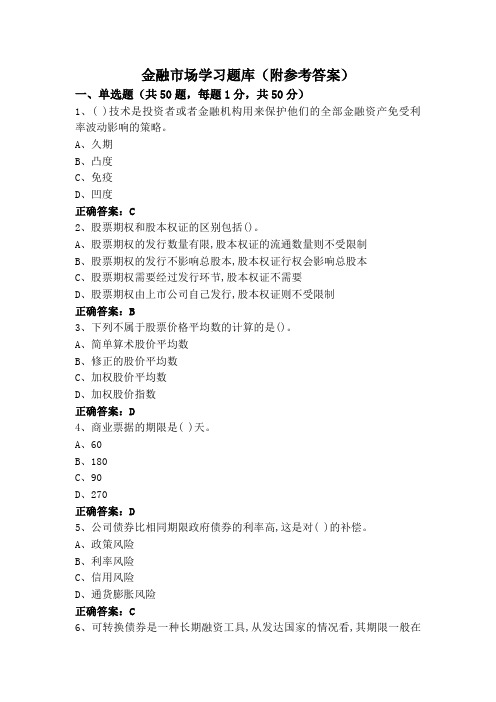
金融市场学习题库(附参考答案)一、单选题(共50题,每题1分,共50分)1、( )技术是投资者或者金融机构用来保护他们的全部金融资产免受利率波动影响的策略。
A、久期B、凸度C、免疫D、凹度正确答案:C2、股票期权和股本权证的区别包括()。
A、股票期权的发行数量有限,股本权证的流通数量则不受限制B、股票期权的发行不影响总股本,股本权证行权会影响总股本C、股票期权需要经过发行环节,股本权证不需要D、股票期权由上市公司自己发行,股本权证则不受限制正确答案:B3、下列不属于股票价格平均数的计算的是()。
A、简单算术股价平均数B、修正的股价平均数C、加权股价平均数D、加权股价指数正确答案:D4、商业票据的期限是( )天。
A、60B、180C、90D、270正确答案:D5、公司债券比相同期限政府债券的利率高,这是对( )的补偿。
A、政策风险B、利率风险C、信用风险D、通货膨胀风险正确答案:C6、可转换债券是一种长期融资工具,从发达国家的情况看,其期限一般在( )。
A、5年以上B、5年到10年C、10年以上D、15年以上正确答案:C7、按照期权购买者执行期权的时限划分期权可分为( )。
A、欧式期权和美式期权B、利率期权和货币期权C、看涨期权和看跌期权D、现货期权和期货期权正确答案:A8、收益率曲线描述了不同期限债券的收益率之间的关系,主要有向上倾斜,平缓或向下倾斜三种形状。
当收益率曲线向上倾斜时,长期利率()短期利率,当收益率曲线向下倾斜时,短期利率()长期利率。
A、低于高于B、高于低于C、低于低于D、高于高于正确答案:D9、( )是以一定单位的本国货币为标准来折算应收若干单位的外国货币的标价法,又称应收标价法。
A、间接标价法B、应付标价法C、直接标价法D、以上全不是正确答案:A10、同其他货币市场信用工具不同,短期国库券交易具有一些较明显的投资特征,以下不属于国库券的四个投资特征中的是( )。
A、违约风险小B、面额小C、流动性强D、收入不免税正确答案:D11、股本权证与股票期权的区别主要在于( )。
金融市场学试题及答案
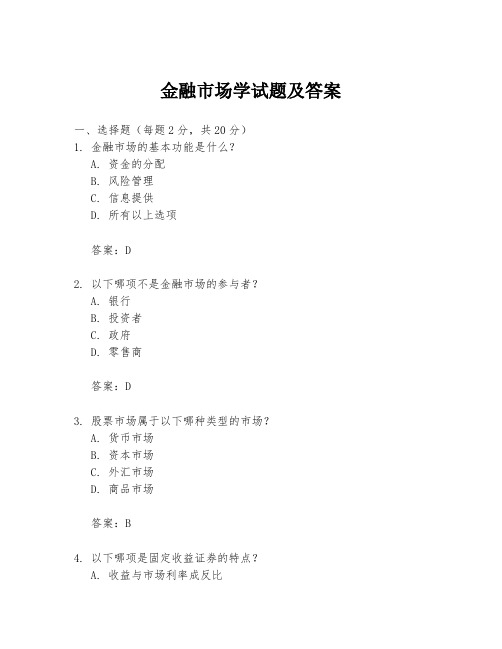
金融市场学试题及答案一、选择题(每题2分,共20分)1. 金融市场的基本功能是什么?A. 资金的分配B. 风险管理C. 信息提供D. 所有以上选项答案:D2. 以下哪项不是金融市场的参与者?A. 银行B. 投资者C. 政府D. 零售商答案:D3. 股票市场属于以下哪种类型的市场?A. 货币市场B. 资本市场C. 外汇市场D. 商品市场答案:B4. 以下哪项是固定收益证券的特点?A. 收益与市场利率成反比B. 收益与市场利率成正比C. 收益不受市场利率影响D. 收益随市场利率波动答案:A5. 期货合约是一种:A. 现货交易B. 远期交易C. 衍生品交易D. 期权交易答案:C6. 期权合约赋予持有者:A. 必须购买或出售标的资产的权利B. 必须购买或出售标的资产的义务C. 选择购买或出售标的资产的权利D. 选择购买或出售标的资产的义务答案:C7. 以下哪项是金融市场风险管理工具?A. 股票B. 债券C. 保险D. 存款答案:C8. 以下哪项不是金融市场的监管机构?A. 证监会B. 银监会C. 保监会D. 教育部答案:D9. 金融市场的效率分为哪三种类型?A. 市场效率、信息效率、交易效率B. 市场效率、操作效率、交易效率C. 信息效率、操作效率、交易效率D. 市场效率、信息效率、执行效率答案:D10. 以下哪项不是金融市场的交易工具?A. 股票B. 债券C. 保险单D. 房地产答案:D二、简答题(每题10分,共30分)1. 请简述金融市场的作用。
金融市场是资金供求双方进行交易的场所,其作用主要包括:资金的分配,风险管理,信息提供,以及提供流动性。
2. 什么是衍生品市场?它与现货市场有何不同?衍生品市场是指交易衍生金融工具的市场,这些工具的价值取决于其他基础资产的价值。
与现货市场不同,衍生品市场交易的不是实际的资产,而是资产的权利或义务。
3. 什么是利率平价理论?它在金融市场中有何应用?利率平价理论认为,两个国家之间的利率差异应该等于这两个国家的货币远期汇率与即期汇率之间的差异。
金融市场学试题及答案解析

金融市场学试题及答案解析一、单项选择题(每题2分,共10分)1. 金融市场的基本功能不包括以下哪一项?A. 资金筹集B. 风险管理C. 价格发现D. 商品交换答案:D2. 下列哪项不是货币市场的典型特征?A. 期限短B. 风险低C. 流动性高D. 收益率高答案:D3. 在金融市场中,以下哪个术语指的是金融资产的买卖双方?A. 投资者B. 借款人C. 经纪人D. 交易对手答案:D4. 以下哪项不是金融市场的主要参与者?A. 政府B. 企业C. 家庭D. 非政府组织答案:D5. 金融市场中的“有效市场假说”是由哪位经济学家提出的?A. 尤金·法马B. 米尔顿·弗里德曼C. 约翰·梅纳德·凯恩斯D. 亚当·斯密答案:A二、多项选择题(每题3分,共15分)6. 金融市场可以分为以下哪些类型?A. 货币市场B. 资本市场C. 外汇市场D. 商品市场答案:A, B, C7. 下列哪些因素会影响金融市场的利率水平?A. 通货膨胀率B. 中央银行的货币政策C. 投资者的风险偏好D. 企业的盈利能力答案:A, B, C8. 在金融市场中,以下哪些属于金融衍生品?A. 股票B. 期货C. 期权D. 债券答案:B, C9. 以下哪些属于金融市场的风险管理工具?A. 保险B. 期货合约C. 期权合约D. 定期存款答案:A, B, C10. 金融市场的监管机构通常承担哪些职责?A. 制定市场规则B. 监督市场行为C. 促进市场发展D. 直接参与市场交易答案:A, B, C三、判断题(每题1分,共5分)11. 金融市场的效率性是指市场能够迅速吸收和反映所有信息。
(对)12. 所有金融市场的风险都是可以完全消除的。
(错)13. 金融市场的流动性是指资产能够以较低成本迅速转换为现金的能力。
(对)14. 金融市场的透明度是指市场信息的公开程度和获取信息的容易程度。
(对)15. 金融市场的全球化使得各国金融市场之间的联系更加紧密,但也增加了系统性风险。
- 1、下载文档前请自行甄别文档内容的完整性,平台不提供额外的编辑、内容补充、找答案等附加服务。
- 2、"仅部分预览"的文档,不可在线预览部分如存在完整性等问题,可反馈申请退款(可完整预览的文档不适用该条件!)。
- 3、如文档侵犯您的权益,请联系客服反馈,我们会尽快为您处理(人工客服工作时间:9:00-18:30)。
American businesses get their external funds primarily frombonds and commercial paper issues.stock issues.bank loans.nonbank loans.Which of the following describes the "lemons problem?"Sellers have more information than buyers and few transactions occur.Buyers have more information than sellers and many transactions occur.Buyers have more information than sellers and few transactions occur.Sellers have more information than buyers and many transactions occur.The concept of adverse selection helps to explainwhy large, well-established corporations find it so difficult to borrow funds in securities markets.which firms are more likely to obtain funds from banks and other financial intermediaries, rather than from the securities markets.why collateral is not a common feature of many debt contracts.all of the above.The principal-agent problem arises because(a) agents have more information about their activities than do the principals.(b) monitoring agents' activities is costly.(c) principals have incentives to free-ride off the monitoring expenditures of other principals.(d) of all of the above.(e) of only (a) and (b) of the above.The fact that only large, well-established corporations have access to securities markets(a) explains why indirect finance is such an important source of external funds for businesses.(b) can be explained by the problem of adverse selection.(c) can be explained by government regulations that prohibit small firms from acquiring funds in securities markets.(d) can be explained by all of the above.(e) can be explained by only (a) and (b) of the above.Poor people have difficulty getting loans becausethey are less likely to benefit from access to financial markets.they are more likely to be dishonest.they typically have little collateral.of all of the above.of none of the above.Financial intermediaries, particularly banks,(a) are experts in the production of information about firms so that they can sort good risks from bad ones.(b) overcome the free-rider problem by primarily making private loans, rather thanpurchasing securities that are traded in the open market.(c) play a greater role in moving funds to corporations than do securities markets.(d) all of the above.(e) only (a) and (b) of the above.Economies of scale allow financial intermediaries to overcome problems of moral hazard.free-riding.high transaction costs.adverse selection.A clause in a debt contract requiring the borrower to purchase insurance against loss of the asset financed with the loan is called acollateral-insurance clause.restrictive covenant.proscriptive covenant.prescriptive covenant.If a financial crisis is thought of as a sequence of events, which of the following events would be least likely to be the initiating cause of the financial crisis?unanticipated decline in price levelstock market declineincrease in interest ratesincrease in uncertaintyMost financial crises in the United States have begun with(a) a steep stock market decline.(b) an increase in uncertainty resulting from the failure of a major firm.(c) a steep decline in interest rates.(d) all of the above.(e) only (a) and (b) of the above.Governments in developing countries sometimes adopt policies that retard the efficient operation of their financial systems. These actions include policies that(a) prevent lenders from foreclosing on borrowers with political clout.(b) nationalize banks and direct credit to politically-favored borrowers.(c) make it costly to collect payments and collateral from defaulting debtors.(d) do all of the above.(e) do only (a) and (b) of the above.______ causes a financial crisis to move into the debt-deflation phase.Increase in interest ratesStock market declineUnanticipated decline in the price levelIncrease in uncertaintyWhich of the following are reported as assets on a bank's balance sheet?(a) bank capital(b) loans(c) borrowings(d) only (a) and (b) of the aboveWhich of the following are reported as liabilities on a bank's balance sheet?reserves and cash itemssecuritiesnontransaction depositsloansOn a bank's balance sheetassets are the bank's sources of funds.liabilities are the bank's use of funds.bank capital equals assets minus liabilities.all of the above.Which of the following statements is false?The expenses involved in servicing accounts (salaries, building rent, etc.) make up over half the costs of running a bank.Transaction deposits are the primary source of bank funds.Demand deposits are checkable deposits that pay no interest.Borrowings include discount loans from the Fed and federal funds.Which of the following are nontransaction deposits?(a) savings accounts(b) small-denomination time deposits(c) certificates of deposit(d) all of the above(e) only (a) and (b) of the aboveBanks acquire the funds they use to purchase income-earning assets from such sources as(a) bank capital.(b) cash items in the process of collection.(c) reserves.(d) all of the above.(e) only (a) and (b) of the above.When $1 million is deposited at a bank, the required reserve ratio is 20 percent, and the bank chooses not to hold any excess reserves but makes loans instead, then, in the bank's final balance sheet,(a) the assets at the bank increase by $1,000,000.(b) the liabilities of the bank increase by $1,000,000.(c) reserves increase by $200,000.(d) each of the above occurs.(e) only (a) and (b) of the above occur.Bank capital(a) provides a cushion against a drop in the value of assets.(b) serves to reassure uninsured depositors that the bank is sound.(c) serves to reassure bank regulators that the bank is not likely to fail due to a few bad loans.(d) does each of the above.(e) does only (a) and (b) of the above.When a new depositor opens a checking account at the First National Bank, the bank's assets _____ and its liabilities _____.decrease; increaseincrease; decreasedecrease; decreaseincrease; increaseBanks hold excess and secondary reserves to(a) satisfy federal and state banking regulations.(b) provide for deposit outflows.(c) satisfy margin requirements.(d) do only (a) and (b) of the above.Which of the following would a bank not hold as insurance against the highest cost of deposit outflow—bank failure?mortgagessecondary reservesexcess reservesbank capitalBeing able to meet deposit outflows is the objective of ______ management.assetliabilityliquiditycapitalAs a result of changes in bank liability management practices over the past few decades, bank liabilities have grown at a slower pace than bank assets.loans have declined as a proportion of total bank assets.negotiable certificates of deposit and borrowings have increased as a proportion of total bank liabilities.banks now view their liabilities as a fixed amount to which assets must be adjusted.Dividing a bank's net income by its capital gives the bank'sreturn on equity.net interest margin.equity multiplier.return on assets.The _____ number of banks in the United States indicates that past regulation of banking fostered _____ competition among banks.large; weaksmall; weaklarge; strongsmall; strongWhich of the following statements concerning bank regulation in the United States are true?(a) The Office of the Comptroller of the Currency has the primary responsibility for state banks that are members of the Federal Reserve System.(c) The Office of the Comptroller of the Currency has sole regulatory responsibility over bank holding companies.(b) The Federal Reserve and the state banking authorities jointly have responsibility for the 1000 state banks that are members of the Federal Reserve System.(d) All of the above are true.(e) Only (a) and (b) of the above are true.Because of financial innovation, banks havesuffered a simultaneous decline of cost and income advantages.achieved competitive advantages in both acquiring and using funds.suffered a decline in their income advantages in using funds but have not experienced a decline in their cost advantages.suffered a decline in their cost advantages in acquiring funds but have not experienced a decline in their income advantages.The practice of creating marketable debt instruments that are backed by otherwise illiquid assets is known ashomogenization.standardization.liquidization.securitization.One factor contributing to the decline in cost advantages that banks once had is the increase in the importance of checkable deposits from under 20 percent of banks' liabilities to over 40 percent today.decline in the importance of savings deposits from over 60 percent of banks' liabilities to under 20 percent today.increase in the importance of savings deposits from under 20 percent of banks' liabilities to over 40 percent today.decline in the importance of checkable deposits from over 60 percent of banks' liabilities to under 10 percent today.A bank that exists only in cyberspace, with no physical location, is commonly called a ______ bank.virtualelectronicclickcyberWhich of the following have stimulated innovation in banking?Developments in information and communications technology.Increases in the volatility of interest rates.Both of the above.So-called fallen angels differ from junk bonds in that(a) junk bonds refer to newly issued bonds with low credit ratings.(b) fallen angels refer to previously issued bonds that have had their credit ratings fall below Baa.(c) fallen angels refer to newly issued bonds with low credit ratings.(d) both (a) and (b) of the above.Which of the following is not a thrift institution?mutual savings bankcredit unionsavings and loan associationcommercial bankWhich institution is typically quite small and makes a substantial portion of its loans to finance new and used automobile purchases?mutual savings bankcredit unionsavings and loan associationcommercial bankThe Federal Home Loan Bank Act of 1932required thrifts to be state chartered.gave credit unions the chance to be state chartered.gave mutual savings banks the choice of being federally chartered.gave thrifts the choice of being state or federally chartered.Financial deregulation in the 1980s led to problemscaused by a sharp decline in interest rates engineered by the Fed.even though S&L managers had the required expertise to manage risk in new lines of business.because regulators had neither the expertise nor the resources to monitor the new activities sufficiently.stemming from bad loans that were quickly overcome by expansion into new lines of business.The principal-agent problem occurs becausethe agent cannot enforce tight restrictions on the principal.the principal does not have the incentive to reduce costs.the agent and the principal have similar incentives and objectives.the agent has an incentive to do the opposite of what is in the interest of the principal.Which of the following category of financial institutions is exempt from federal taxation?mutual savings bankscredit unionscommercial bankssavings and loan associationsThe total assets of savings and loans decreased rapidly between 1988 and 1992. After 1992theycontinued to decrease but at a slower pace.began to increase at a rapid pace.remained relatively constant and then began rising in the late 1990s.remained constant.Since the early 1990s the average size of savings and loan associations has shown no upward or downward trend.increased slightly.decreased substantially.increased substantially.decreased slightly.An indicator of the resurgent health of the savings and loan industry is the fact that today goodwill accounts for a smaller amount of capital than in the 1980s.goodwill accounts for about the same amount of capital as in the 1980s.goodwill accounts for a larger amount of capital than in the 1980s.goodwill is no longer used as a part of capital.What gives the best indicator of the future of the savings and loan industry?the total assets of S&Lsthe value of goodwill of S&Lsthe average size of S&Lsthe number of S&LsCommon bond membership is the most important distinguishing feature of savings and loans.credit unions.industrial banks.mutual savings banks.Regulation and supervision of credit unions is handled bythe U.S. Central Credit Union.the Comptroller of the Currency.the National Credit Union Administration.the Office of Thrift Supervision.the Federal Reserve.。
